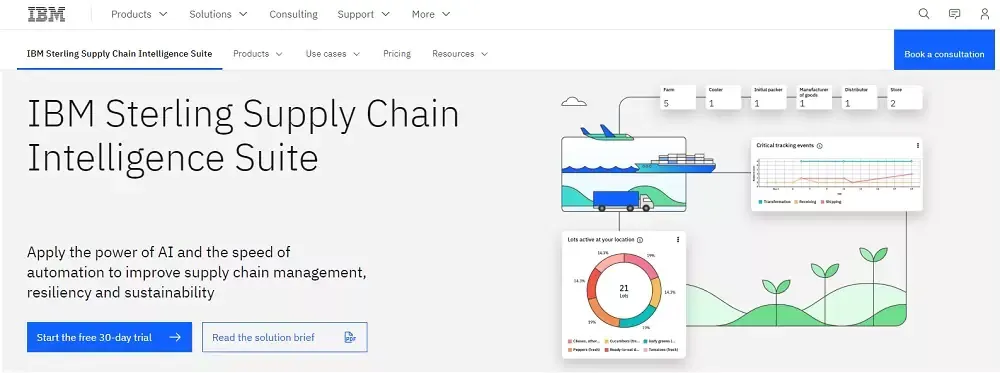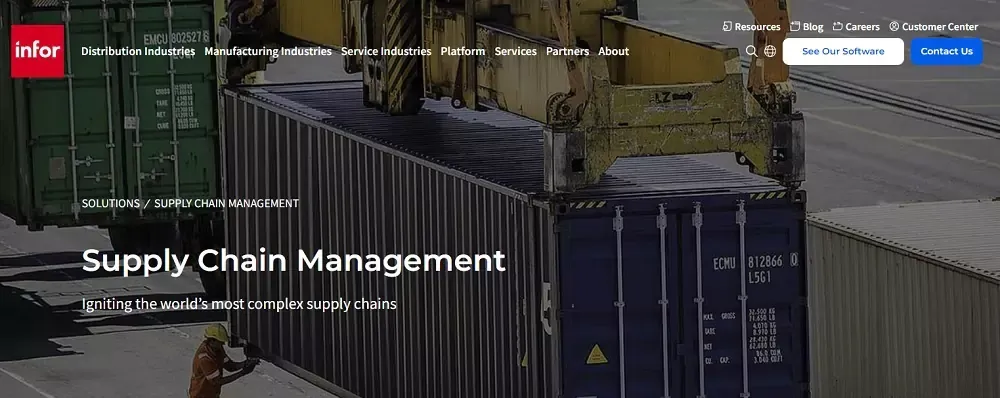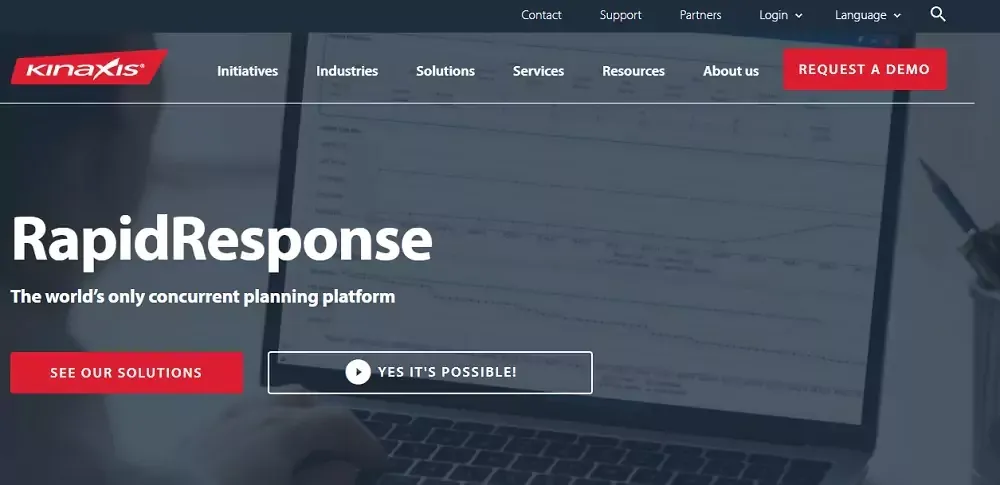
Supply Chain Management (SCM) is like the backbone of the business economies. It ensures all products move non-stop from manufacturers to consumers. It also provides real-time data to understand customers better. In this modern world, you need to use SCM software for your business to catch up to most of your competitors who are using it. You must use supply chain management software to overcome your competitors, seamlessly run your business, understand your customers for higher goals, track your products from the factory to your customers, and finally get great profits to grow your business.
That's why, in this article, we'll discuss 7 of the best Supply Chain Management software solutions, highlighting their features, benefits, and pricing plans to help businesses and organizations understand the importance of these tools in the business world.
Best Supply Chain Management Software for 2024
1. SAP Integrated Business Planning (IBP)
SAP IBP is one of the best software for supply chain management. It helps organizations get real-time data so that they can adapt to changing market conditions. It helps organizations plan for a sustainable, risk-tolerant future, provides responsiveness, and helps organizations stay ahead of their competitors using supply chain analytics, what-if simulations, alerts, and more.

Key Features:
- Demand Planning
- Supply Chain Control Tower
- Inventory Optimization
- Response and Supply Planning
- Sales and Operations Planning (S&OP)
- Scenario Planning
- Collaborative Planning
- Real-time Analytics
- Predictive Analytics
- Integrated Business Planning Analytics
- Data Integration and Connectivity
- Cloud-based Platform
- Multi-tier Supply Chain Visibility
- Demand Sensing
- Order-based Planning
- Exception Management
- Advanced S&OP Analytics
- Integrated Business Planning for Finance
- Machine Learning Capabilities
- Demand-driven MRP (Material Requirements Planning)
2. Oracle SCM Cloud
Oracle SCM Cloud software is best suited for those organizations that need solutions for quick changes in demand, supply, and market conditions. It helps businesses make plans for demands, supplies, order fulfillment, and development across your supply chain. It also helps businesses collaborate end-to-end to increase services, reduce disruptions, and minimize costs. Oracle SCM Cloud ensures higher customer satisfaction, full visibility, and control over the supply chain. It also has an integrated manufacturing execution system (MES), built-in supply chain integration, IoT, and AI shop floor scheduling and execution. It has a major role in optimizing decisions and controlling quality and cost. Finally, for better customer satisfaction, this Oracle SCM solution features rapid order execution, excellent service, and improved margins.

Key Features:
- Order Management
- Inventory Management
- Procurement
- Product Lifecycle Management
- Manufacturing
- Supply Chain Planning
- Demand Management
- Logistics
- Transportation Management
- Global Order Promising
- Supplier Portal
- Oracle Social Network
- Mobile Supply Chain Applications
- Analytics and Reporting
- Integration with Oracle Cloud Applications
- Collaboration and Visibility
- Cost Management
- Regulatory Compliance
- Warehouse Management
- In-Memory Cost Management
3. Microsoft Dynamics 365 Supply Chain Management
Microsoft Dynamics 365 Supply Chain Management software is an advanced solution with multiple SCM features to improve supply chain resiliency, visibility, and efficiency. It provides real-time and AI-driven insights to overcome issues in the supply chain, improve forecast accuracy, streamline and optimize sourcing decisions, and boost manufacturing with various production strategies. It also encourages efficiency in warehouses, sales, pricing management, maintenance, AI automation, and extensibility. This SCM solution also teaches new users through various documentation and training resources so that new users make the most of Microsoft Dynamics 365 Supply Chain Management. It is quite adaptable and powerful software that can automatically react to challenges while using real-time visibility, agile planning, and advanced insights. This SCM software from Microsoft is designed for businesses to streamline their supply chains, solve supply chain problems, and improve operational efficiency, product quality, and profitability.

Key Features:
- Advanced Warehousing
- Inventory Management
- Order Management
- Procurement and Sourcing
- Product Information Management
- Transportation Management
- Manufacturing Execution
- Quality Management
- Demand Forecasting
- Vendor Collaboration
- Asset Management
- Internet of Things (IoT) Integration
- Power Platform Integration
- Business Intelligence and Analytics
- Role-based Workspaces
- Mobile Access
- Lifecycle Services
- Global Capabilities
- Regulatory Compliance
- Finance Integration
4. IBM Sterling Supply Chain Suite
IBM Sterling Supply Chain Suite is powered by AI for optimization and automation to improve supply chain resiliency, sustainability, and agility. It transforms traditional supply chains into digital supply chains while providing actionable insights, smarter workflows, and intelligent automation. This suite includes different modules such as IBM Food Trust, IBM Transparent Supply, IBM Trust Your Supplier, and IBM MRO IO. The main focus of this software is to help organizations reduce inventory levels, trace items more efficiently, and manage supply chain issues effectively. It aims to provide organizations with the tools and insights to make informed decisions, improve staff productivity, and grow supply chain management flexibility and sustainability.

Key Features:
- Order Management
- Inventory Visibility
- Order Promising
- Supply Chain Visibility
- Global Inventory Optimization
- Transportation Management
- Warehouse Management
- Supplier Collaboration
- B2B Integration
- Trading Partner Onboarding
- Data Analytics and Reporting
- AI-powered Insights
- Dynamic Order Routing
- Real-time Alerts and Notifications
- Multi-Enterprise Collaboration
- Cloud-based Platform
- Intelligent Order Lifecycle Management
- Returns Management
- Cross-Border Fulfillment
- End-to-End Supply Chain Orchestration
5. Blue Yonder
Blue Yonder is a popular supply chain management software that provides AI and Machine Learning platforms and tools for over 3,000 retail, manufacturing, and logistics customers globally. It helps organizations improve business strategy with predictive insights and data-driven decisions to provide greater resiliency and growth. It accesses global networks, inventory, and global suppliers to provide unmatched quality and efficiency. When you use Blue Yonder for supply chain management, you provide customers a great experience with scale and performance to build customer trust and loyalty. This software also enhances task allocation and resource planning for smarter utilization, boosts satisfaction, increases productivity, reduces costs, and increases overall customer experience.

Key Features:
- Demand Planning
- Supply Chain Visibility
- Inventory Optimization
- Order Fulfillment
- Warehouse Management
- Transportation Management
- Predictive Analytics
- Machine Learning
- Artificial Intelligence
- Demand Sensing
- Dynamic Pricing
- Retail Planning
- Workforce Management
- Price Optimization
- S&OP (Sales and Operations Planning)
- Category Management
- Replenishment Optimization
- Promotions Management
- Collaborative Planning
- Cloud-Based Platform
6. Infor SCM
Infor SCM provides advanced tools for optimizing various tasks of the supply chain, such as warehouse management, global trade and finance, planning and forecasting, and supply planning. It has a variety of features and benefits for improving the efficiency of the supply chain, visibility, and control. Infor SCM also improves end-to-end supply chain visibility, improves productivity, reduces costs, and helps organizations make data-driven and informed decisions to enhance overall supply chain performance. Infor Supply Chain Management software offers several useful tools and resources to supply various industries and business requirements.

Key Features:
- Demand Planning
- Supply Chain Visibility
- Inventory Management
- Order Management
- Warehouse Management
- Transportation Management
- Supplier Collaboration
- Procurement
- Manufacturing Execution
- Production Planning
- S&OP (Sales and Operations Planning)
- Forecasting
- Multi-Channel Fulfillment
- Demand Sensing
- Quality Management
- Global Trade Compliance
- Analytics and Reporting
- Integration Capabilities
- Cloud-Based Platform
- Mobile Access
7. Kinaxis RapidResponse
Kinaxis RapidResponse is another great software for managing the supply chain. It allows organizations to balance supply and demand across their end-to-end supply chain in real time. It has a variety of features for sales and operations planning, demand planning, supply planning, inventory planning, and capacity planning. It is a cloud-based, secure, and scalable solution that offers a clean user interface, and several other features, including flexible dashboards, exception-based alerts, and scenario planning features. This software is designed for businesses to improve supply chain operations, and planning efficiency and enable quick responses to overall demand and supply challenges.

Key Features:
- Supply Chain Planning
- Demand Planning
- Inventory Management
- Order Fulfillment
- Sales and Operations Planning (S&OP)
- Scenario Analysis
- Multi-Tier Visibility
- Real-Time Collaboration
- Rapid Scenario Planning
- Capacity Planning
- Root Cause Analysis
- Advanced Analytics
- Risk Management
- Concurrent Planning
- Demand Sensing
- In-Memory Computing
- Supplier Collaboration
- Integrated Business Planning (IBP)
- Cloud-Based Platform
- Mobile Accessibility
Follow us on X.com, Facebook and Linkedin 🔃
Useful Apps and Websites
- 1Password Password Management
- Adcreative.AI — AI Tool for Advertisement
- Apollo.io — AI Sales Tool
- Close CRM — Close more deals
- Connecteam — Team and Employee Management
- Monday.com — Automate tasks and streamline processes
- Notion — Your connected workspace for wiki, docs & projects
- Quillbot — AI tool for Paraphrase, check grammar, analyze tone, improve fluency, and more
- Reclaim AI — Smart Scheduling App for Teams
- SocialBee — AI-Powered Social Media Management Tool

